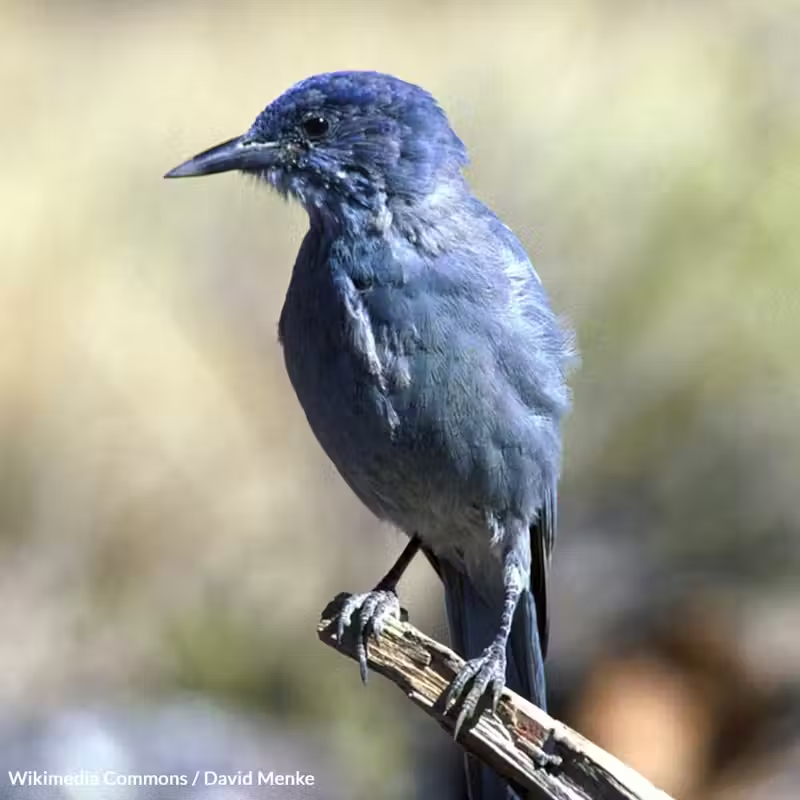Fight For The Future Of The Pinyon Jay And Save Our Ecosystems
7,294 signatures toward our 30,000 Goal
Sponsor: The Animal Rescue Site
The Pinyon Jay is disappearing at a devastating rate, putting entire ecosystems in danger. Sign the petition and take action before this iconic species vanishes forever.

The Pinyon Jay, a vital bird of the American West, is disappearing at an alarming rate. Since the 1960s, its population has plummeted by more than 80%, threatening not only the species but the ecosystems it supports. The U.S. Fish and Wildlife Service (USFWS) has delayed critical action to protect this bird under the Endangered Species Act, leaving it vulnerable to extinction. We can’t afford to wait any longer1.
A Keystone Species of Western Forests
Pinyon Jays are more than just birds. They are key players in the survival of the pinyon pine forests that spread across the Western United States. These forests, home to countless species, rely on the Pinyon Jay to bury pine nuts and create new trees2. Without these birds, entire woodlands could disappear, taking with them vital resources for wildlife and humans alike.
Climate Change and Habitat Destruction Are Accelerating the Decline
Climate change and habitat destruction have accelerated the Pinyon Jay’s decline. Droughts, rising temperatures, and invasive species like bark beetles are devastating pinyon pine forests3. As these trees struggle to survive, the Pinyon Jay is left without food, causing the birds to abandon breeding and further shrinking their already endangered population4.
Delays in Protection Could Seal the Pinyon Jay’s Fate
Despite its critical role in sustaining the environment, the Pinyon Jay is not receiving the protections it desperately needs. In 2021, conservation groups petitioned the USFWS to list the Pinyon Jay as endangered5. However, despite widespread support, the agency has pushed back its decision until 2028, citing budget constraints and staffing issues5. This delay puts the future of the Pinyon Jay—and the ecosystems that rely on it—at risk.
Why We Must Act Now
We need to act now. Local conservation efforts, such as studies in Wyoming and Utah, are gathering crucial data to inform better management strategies2. But without federal protection, these efforts will not be enough to save the species from extinction. If the Pinyon Jay is listed as endangered, it will unlock the necessary resources to protect its habitat, restore its population, and ensure its survival.
Protecting the Pinyon Jay Is Protecting Our Ecosystem
This is not just an environmental issue—it is a matter of preserving the natural heritage of the American West. Without immediate intervention, we risk losing a bird that plays a crucial role in maintaining the balance of our ecosystems. The Pinyon Jay is a keystone species, and its extinction would trigger far-reaching consequences for wildlife, forests, and future generations3.
It’s Time to Take Action
We cannot wait any longer for the USFWS to act. It is time to raise our voices and demand immediate protection for the Pinyon Jay under the Endangered Species Act. Join us in urging the USFWS to list the Pinyon Jay as endangered and save this essential bird from extinction. Sign the petition today and help ensure a future where the Pinyon Jay—and the forests it helps sustain—continue to thrive.
Take action now. Sign the petition to protect the Pinyon Jay!
- Alysha Lundgren, St. George News (5 January 2024), "Iconic jay native to Southern Utah rapidly vanishing."
- Amber Steinmetz, Cowboy State Daily (21 July 2024), "Wyoming Works To Save Rapidly Vanishing Pinyon Jay That’s Down 80%."
- Defenders of Wildlife (8 October 2024), "Defenders Sue Failure To Respond To Petition To Protect Pinyon Jay."
- Bryce Dix, Source NM (15 October 2024), "Environmentalists threaten lawsuit over delayed protections for Pinyon Jay."
- Geoffrey Plant, Taos News (1 July 2024), "Decision on Pinyon Jay protections pushed to 2028."
The Petition:
To the U.S. Fish and Wildlife Service,
We, the undersigned, respectfully call on the U.S. Fish and Wildlife Service to urgently list the Pinyon Jay (Gymnorhinus cyanocephalus) as a protected species under the Endangered Species Act.
The Pinyon Jay, once a vibrant and common bird throughout the American West, has experienced an alarming population decline of over 80% in the last half-century. This decline is not just an ecological concern but a moral one. Pinyon Jays are essential to the survival of the pinyon-juniper woodlands, as they disperse the seeds of pinyon pines, which many other species depend on. Without these birds, entire ecosystems are at risk of collapse.
The threats facing the Pinyon Jay are many: habitat destruction due to agricultural expansion and development, prolonged droughts linked to climate change, and the devastation caused by invasive species such as bark beetles. Despite these known dangers, action to protect this species has been slow. Delays in granting the Pinyon Jay protection under the Endangered Species Act have left the species and the woodlands they help sustain in peril. Time is running out for both the bird and the ecosystems it supports.
The Pinyon Jay is not just a bird—it is a keystone species in the intricate balance of our natural world. Its disappearance would set off a cascade of environmental impacts, negatively affecting countless other species and degrading the health of our forests. Listing the Pinyon Jay as endangered will unlock essential resources to safeguard its habitat, restore its population, and preserve the ecological legacy it provides.
Protecting the Pinyon Jay is an act of humanity, as it represents our commitment to safeguarding our planet for future generations. The survival of this species is deeply intertwined with the survival of the forests, wildlife, and natural resources that define the American West.
By taking decisive action now, we can ensure a future where the Pinyon Jay thrives and continues to play its vital role in maintaining healthy ecosystems. Protecting this bird will help preserve the biodiversity and environmental stability that benefit us all.
Sincerely,